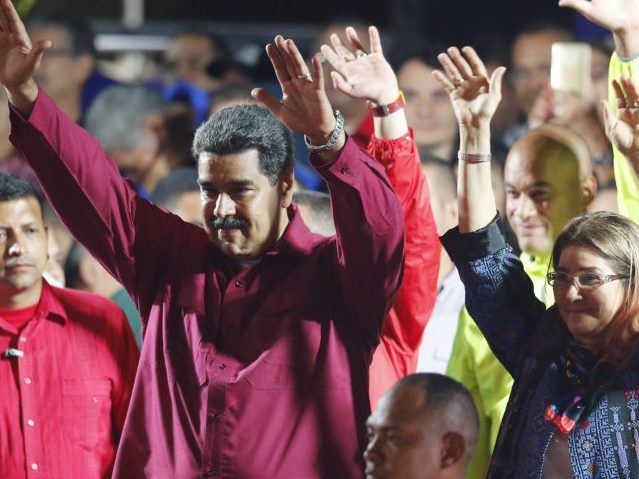
At least five of Venezuela’s most populated states experienced a wave of protests Monday afternoon and into Tuesday, prompting reports that police were using tear gas and attacking unarmed protesters to silence dissent.
Venezuelans are protesting Sunday’s presidential election, in which dictator Nicolás Maduro banned opposition candidates from running who were not former chavistas and assorted other socialists. Even those allowed to run against Maduro documented thousands of cases of irregularities at voting stations and international organizations and state condemned the election as fraudulent and not representative of the will of the Venezuelan people.
Venezuela’s El Nacional newspaper reported Tuesday that protests sprung in at least four states: Carabobo, Táchira, Mérida and Bolívar. El Universal reported that a large protest occurred Monday afternoon in Nueva Esparta; opposition leaders posted images of themselves leading a protest on the main highway cutting through Caracas.
“Venezuela awoke GROWN, on its FEET,” wrote opposition leader and anti-socialist María Corina Machado on Twitter. “Our people defied the tyranny and DISOBEYED. Today the people are UNITED. The PATH is to advance until we achieve the ouster of the dictator.”
Machado’s reference to disobedience is a note on the woeful turnout of Sunday’s election, which opposition groups urged voters to boycott to prevent lending it legitimacy. While the government’s official National Electoral Commission (CNE) claimed a 46 percent turnout rate, multiple independent outside observers found that over 80 percent of Venezuelan voters failed to show up at the polls. The CNE estimate is still record low turnout for a presidential election, even if that were the legitimate number.
Venezuela amaneció CRECIDA; de PIE.
Nuestro pueblo desafió a la tiranía y DESOBEDECIÓ.Hoy el pueblo está UNIDO.
La RUTA ES avanzar hasta lograr la salida del dictador. #VenezuelaTRIUNFARÁ pic.twitter.com/k8or77k9eu— María Corina Machado (@MariaCorinaYA) May 21, 2018
Protesters, many young students, took the streets of Caracas independently. In a video posted by the national broadcaster NTN24, a group of protesters can be seen marching through Caracas holding a sign reading, “There is no time left! The time for the courageous is here, together we are more.”
? [#VIDEO] “Las calles son del pueblo y no de la dictadura”: Venezolanos protestan contra el “fraude electoral” en Altamira #21May https://t.co/Qz8HwToUK9 pic.twitter.com/BEu00AQLzy
— NTN24 Venezuela (@NTN24ve) May 21, 2018
In Aragua state, youth opposition leaders also took to the streets to protest Maduro. Aragua is the state where Vice President Tareck El Aissami, a U.S.-designated “drug kingpin,” served as governor before being promoted to the executive second-in-command post.
#SoyVenezuela en #Aragua en la calle hoy #21May porque la farsa electoral de ayer solo es un motivo más para seguir aquí, luchando por nuestra libertad. #VenezuelaTriunfará pic.twitter.com/fRTb0v5RHA
— Soy Venezuela (@SoyVenezuela) May 21, 2018
Nueva Esparta – a tropical state featuring the tourist destination Margarita Island that rarely makes news for protests – also hosted a display against Maduro. Students at Margarita University – Unimar took to the streets near campus to demand free and fair elections and for Maduro to step down. Reports indicate that the Nueva Esparta protests remained peaceful.
The most violent protests reportedly occurred in San Cristóbal, the regional capital of Táchira state. Táchira, on the far western border with Colombia, has long been the nation’s most vocal hotbed of socialist resistance. The mayor of San Cristóbal, Daniel Ceballos, has been in prison in Caracas for nearly two years for speaking out against Maduro. By official CNE estimates, over 70 percent of Táchira did not participate in Sunday’s election.
On Monday night, the Venezuelan outlet Runrunes reports that protesters began blocking roads in San Cristóbal, burning debris and amassing tree branches in protests. Police responded to the incident, the outlet claims, with tear gas and rubber bullets. The outlet reports that two children, aged 10 and 14, were hit by rubber bullets. Two people were arrested and at least eight injured. El Nacional adds that three people were arrested, among them “a 16-year-old suffering from Asperger’s disease.”
#Entérate: Desde Barrio Sucre, en el estado Táchira militares dispersaron la manifestación de la comunidad. Allí fueron detenidos Álvaro Abril y Javier Gómez y se reportaron al menos ocho heridos de perdigón. #21May pic.twitter.com/TjeRwOdxqt
— VPItv (@VPITV) May 22, 2018
Other protests are less well-documented on social media. El Nacional reports that, in Bolívar state, residents protested Monday night by banging pots and pans in their homes, a common act of political dissent in South America. Police reportedly responded by “hurling tear gas bombs at the buildings” where the noise was coming from.
Maduro scheduled an election for May 20 in January, giving other candidates little time to organize a campaign and parties almost no time to choose a candidate. The nation’s courts banned the Democratic Unity Roundtable (MUD), the main opposition coalition in the country, from fielding a candidate, instead stating that the member parties of the MUD must each nominate a candidate, forcing the opposition to divide. Instead, the MUD urged supporters to boycott the election.
According to the CNE, Maduro “won” Sunday’s election with about six million votes. The international community, particularly in Latin America, condemned the election as a farce and demanded that Maduro step down from his post. Several European countries are considering sanctions against Maduro. The United States announced Monday a new round of sanctions that prohibit “all transactions related to the purchase of any debt owed to the government of Venezuela, and this includes accounts receivable by any U.S. person or anyone within the United States.”
via Breitbart News
Enjoy this article? Read the full version at the authors website: http://www.breitbart.com
